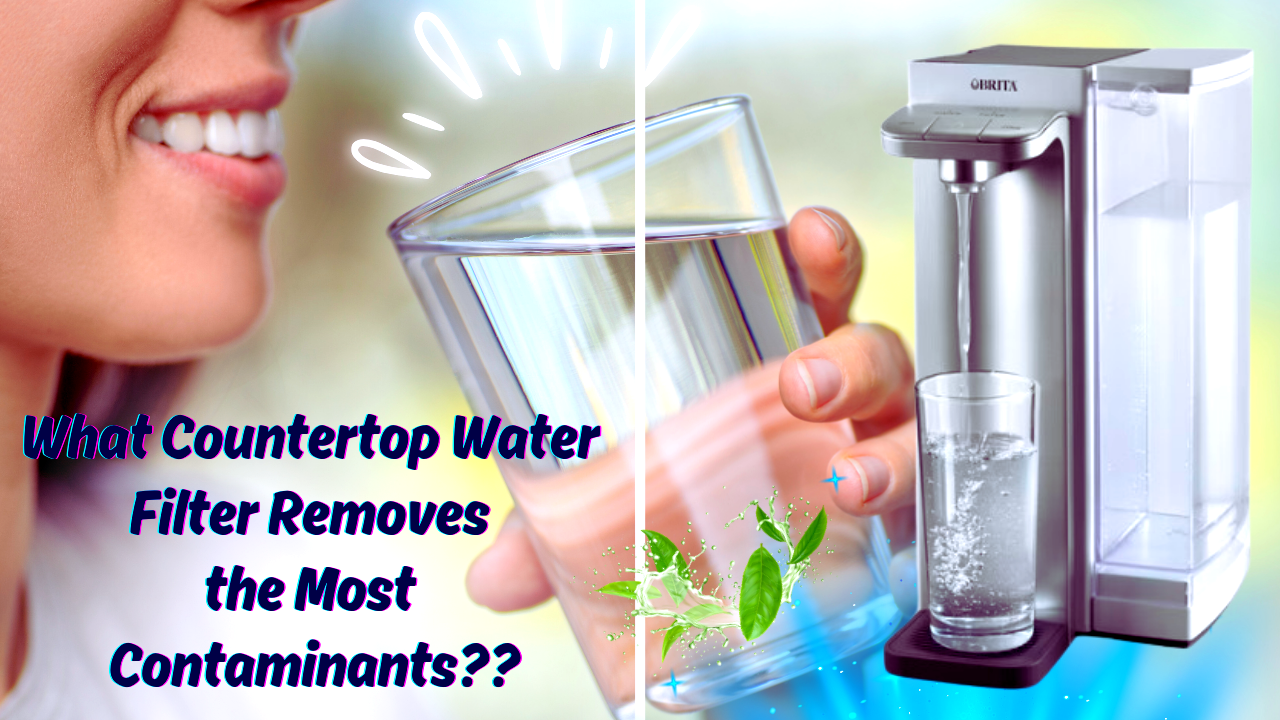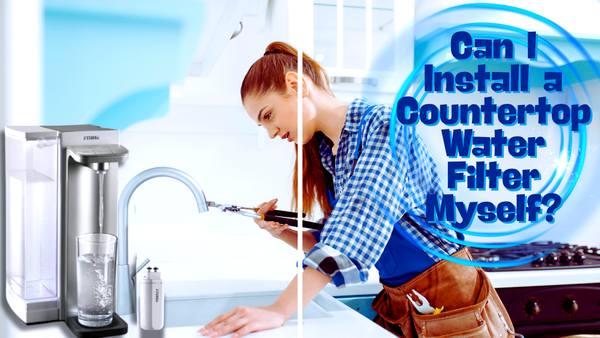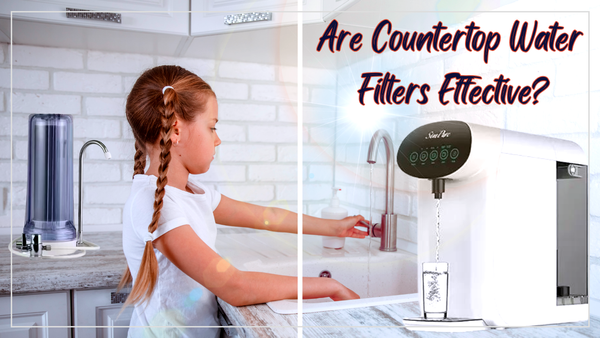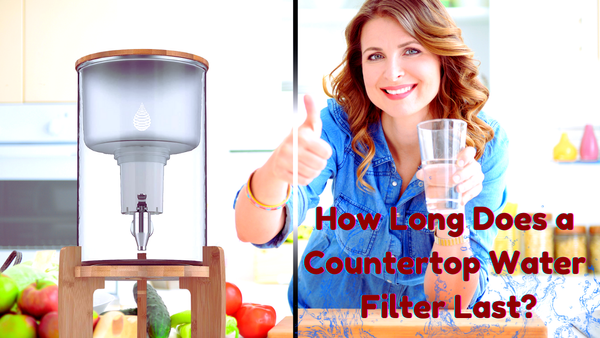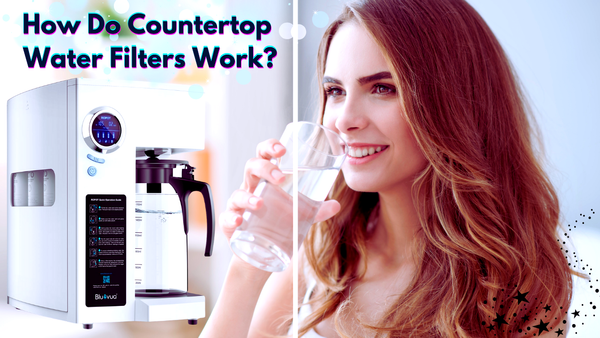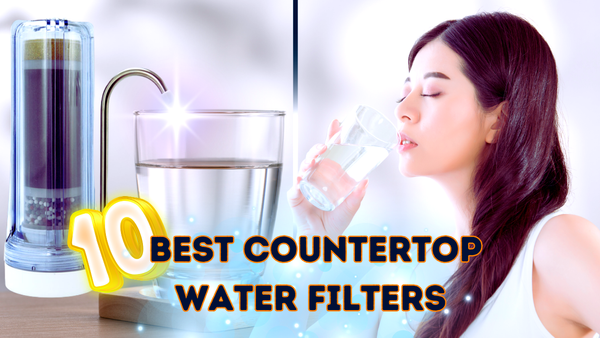Key Takeaways:
- Countertop water filters vary in their ability to remove contaminants, with some models excelling in eliminating a wide range of harmful substances.
- Reverse osmosis systems and activated carbon filters are the most effective filtration methods for ensuring clean drinking water.
- Regular maintenance and timely replacement of filter cartridges are crucial for maintaining the efficiency of countertop water filters.
Are you concerned about the water quality and safety of your drinking water? With so many countertop water filters available, knowing which one does the best job of removing harmful contaminants can be challenging. Compared to more complex systems, the best countertop water filters are known for their affordability and ease of use. In this guide, we’ll explore how different types of filters work, the most common contaminants they target, and how you can choose the best one for your needs.
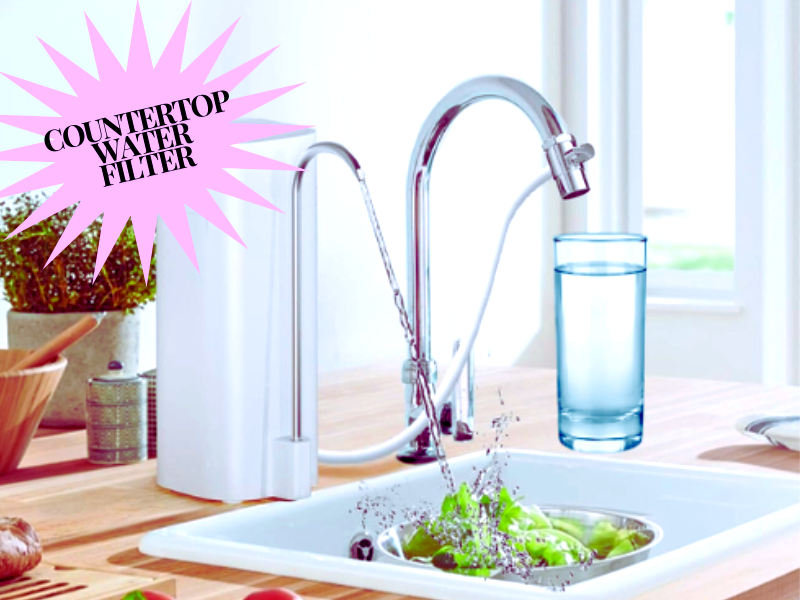
What Are Countertop Water Filters?
Countertop water filters are devices placed on your kitchen counter that filter tap water before you use it. They are a popular choice because they don’t require installation, are easy to use, and can provide clean, filtered water directly from your tap. A countertop filter comes in various designs, and it is important to look for certifications to ensure they effectively reduce harmful contaminants. These filters come in various designs and use different filtration methods to clean your water. These filters are an excellent choice for those seeking effective water purification without the need for complex installations.
Types of Countertop Water Filters
There are several types of countertop water filters, each using a unique filtration process. Here’s a quick overview of the most common types: Each type of filter offers varying levels of contaminant removal, making it important to choose one that meets your specific needs. Among these, the activated carbon filter is particularly effective at removing specific contaminants such as chlorine, fluoride, and various impurities from tap water.
Adding a countertop water filtration system can be particularly beneficial for users who are unsure about which type of filter to select, as these systems are often certified to meet reliable standards.
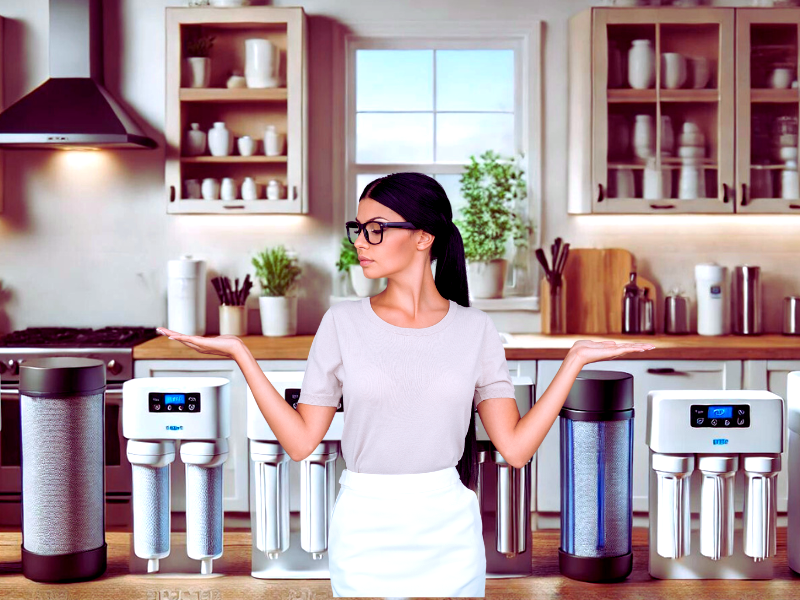
1. Activated Carbon Filters
Activated carbon filters, also known as activated carbon filter systems, are one of the most common types of countertop water filters and play a crucial role in multi-stage filtration systems. They use activated carbon, a form of carbon that has been treated to make it highly porous. This porosity allows it to adsorb (not absorb) contaminants like chlorine, volatile organic compounds (VOCs), and some heavy metals through a process known as adsorption. The carbon granules or blocks trap these contaminants, leaving you with cleaner water.
Key Points:
- Effective for removing chlorine, odors, and some harmful contaminants.
- Does not remove minerals, so it retains healthy minerals in the water.
2. Reverse Osmosis Systems
Reverse osmosis (RO) systems are more advanced filters that use a semi-permeable membrane to remove contaminants. In this process, water is pushed through a membrane that blocks contaminants like heavy metals, bacteria, and dissolved solids. The filtered water is then collected for drinking.
Key Points:
- Removes a wide range of contaminants, including heavy metals and microorganisms.
- Often includes multiple filters, such as carbon filters and sediment filters, to enhance the filtration process.
3. Carbon Filtration
Carbon filtration is a broad term that includes both activated carbon and other carbon-based filters. Among these, the activated carbon filter is particularly noted for its effectiveness in removing chlorine, odors, and some harmful contaminants. These filters work by attracting and trapping contaminants in their pores. Granular activated carbon (GAC) filters are particularly effective at improving taste and odor. Granular activated carbon (GAC) and carbon block filters are common types of carbon filtration.
Key Points:
- Effective for improving taste and odor.
- May not remove all types of contaminants, especially those that are not adsorbed by carbon.
4. Multi-Stage Filters
Some countertop water filters use a combination of filtration methods to provide thorough cleaning. These multi-stage filters might include activated carbon, reverse osmosis, and other filtration techniques. These multi-stage filters often include several filtration stages to ensure comprehensive contaminant removal. It is important to regularly replace the countertop water filter cartridge to maintain filtering effectiveness, as they do not last indefinitely. This combination helps tackle a wide range of contaminants.
Key Points:
- Provides comprehensive filtration.
- Can be more expensive due to the multiple filters involved.
Common Contaminants in Tap Water
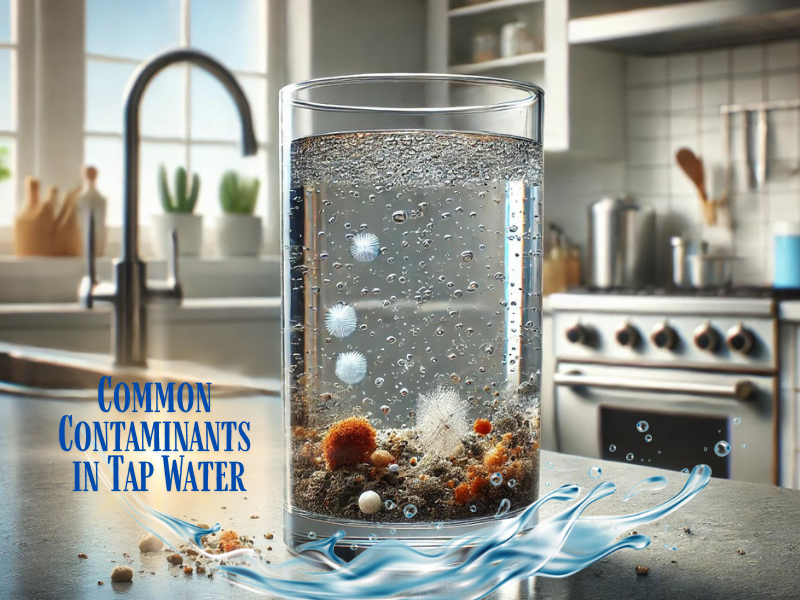
Understanding what waterborne contaminants are in your tap water can help you choose the right filter. Here are some common contaminants that water filters address:
1. Heavy Metals
Heavy metals like lead, mercury, and arsenic can be harmful if consumed in large amounts. They can come from old pipes, industrial waste, or natural sources. Reverse osmosis systems are particularly good at removing these metals. Reverse osmosis systems are particularly effective at lead removal, ensuring safer drinking water.
2. Volatile Organic Compounds (VOCs)
VOCs are chemicals that can evaporate into the air and mix with water. They often come from pesticides, solvents, and industrial chemicals. Activated carbon filters are effective at removing VOCs from water.
3. Harmful Microorganisms
Bacteria, viruses, and protozoa can be present in unfiltered tap water. These microorganisms can cause illness if ingested. Some countertop filters, particularly those with UV light or advanced filtration systems, are designed to kill or remove these harmful microorganisms. These filters are designed to address bacterial contamination, providing safer drinking water.
4. Chlorine and Chloramine
Chlorine and chloramine are chemical disinfectants used by water treatment facilities to disinfect water. However, they can affect the taste and odor of your water. Activated carbon filters are effective at removing these chemicals.
5. Sediment
Sediments like sand, dirt, and rust can be in tap water. Sediment filters, often used in multi-stage filtration systems, help remove these particles.
Popular Countertop Water Filters
There are many countertop water filters available on the market, each with its features and benefits. Some of the most popular models include the Berkey Water Filter, the APEC RO-CTOP-C Portable Countertop Reverse Osmosis Water Filter, and the Aquasana AQ-4000W Countertop Water Filter. Each of these models is known for its exceptional filter performance and reliability.
Berkey Water Filter
The Berkey Water Filter is a popular choice because it can remove a wide range of contaminants, including bacteria, viruses, heavy metals, and VOCs. It uses a combination of activated carbon and other filtration media to provide clean, safe drinking water. The Berkey filter is also known for its durability and long lifespan.
APEC RO-CTOP-C Portable Countertop Reverse Osmosis Water Filter
The APEC RO-CTOP-C is a portable reverse osmosis system that provides high-quality filtered water. It uses a multi-stage filtration process, including a reverse osmosis membrane, to achieve up to 99% contaminant reduction. The APEC RO-CTOP-C is easy to install and maintain, making it a popular choice for those seeking a reliable countertop water filter.
Aquasana AQ-4000W Countertop Water Filter
The Aquasana AQ-4000W is a compact and efficient countertop water filter that uses a combination of activated carbon and other filtration media to remove contaminants. It is effective at removing chlorine, lead, VOCs, and other harmful substances. The Aquasana AQ-4000W is also easy to install and maintain, making it a convenient option for many households. The Aquasana AQ-4000W is also known for its long filter lifespan, making it a cost-effective choice for many households.
How to Choose the Best Countertop Water Filter

Choosing the best countertop water filter depends on several factors, including water quality, budget, and specific needs. Here are some tips to help you make an informed decision: Conducting water testing can help you identify the specific contaminants in your tap water, guiding you to the most suitable filter. Selecting a certified countertop water filtration system is crucial to ensure it meets reliable standards and suits your specific needs.
1. Know Your Water Quality
Before purchasing a water filter, test your tap water to identify contaminants. This will help you choose a filter that targets those specific contaminant levels. Many water filters come with a water quality test kit, or a professional can test your water.
2. Consider the Filtration Methods
Different filters use different methods to clean water. An activated carbon filter is particularly effective at removing chlorine and improving taste, making it a popular choice for many households. Activated carbon filters are great for removing chlorine and improving taste, while reverse osmosis systems provide a more thorough filtration by removing a wide range of contaminants. It is important to consider the lifespan and maintenance of a countertop water filter cartridge, as they do not last indefinitely and require regular replacement to maintain filtering effectiveness. Multi-stage filters combine several methods for comprehensive cleaning. Evaluating the filtration efficiency of each method can help you determine which filter best meets your needs.
3. Check the Filter Life and Replacement Costs
Filters need to be replaced regularly to maintain their effectiveness. Check the filter life of the model you’re considering and the cost of replacement filters. Some filters may require more frequent changes, which can add to the overall cost.
Be sure to follow the recommended maintenance schedule to ensure optimal filter performance.
4. Look for Certifications
Certifications from organizations like the National Sanitation Foundation (NSF) or the Water Quality Association (WQA) can indicate that a filter has been tested and meets certain performance standards. Look for filters with these certifications to ensure quality and safety.
5. Think About Installation and Maintenance
Countertop water filters are generally easy to install and maintain. However, some models may require more complex setup or regular maintenance. Choose a filter that fits your comfort level and lifestyle. Choose a filter that is user-friendly and fits your comfort level and lifestyle.
Maintaining Your Countertop Water Filter
Proper filter maintenance is essential for ensuring the effectiveness and longevity of your countertop water filter. This includes regular cleaning, timely replacement of filter cartridges, and periodic inspections to ensure the filter is functioning correctly.
Cleaning Your Countertop Water Filter
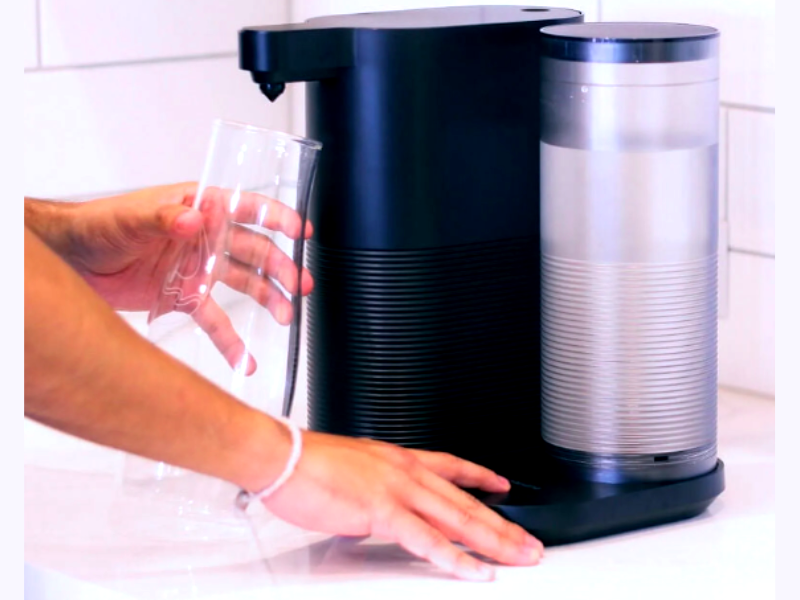
Regular cleaning of your countertop water filter is important to prevent the buildup of contaminants and ensure optimal performance. Follow the manufacturer’s instructions for cleaning and maintenance, and be sure to clean the filter housing and other components as needed. Establishing a regular cleaning schedule can help prevent the buildup of contaminants and ensure optimal performance.
Replacing Filter Cartridges
Timely replacement of filter cartridges is crucial for maintaining the efficiency of your countertop water filter. Most filters have recommended replacement intervals, which can vary depending on the specific model and usage. Be sure to follow the manufacturer’s guidelines for replacing filter cartridges to ensure your water remains clean and safe.
Inspecting Your Filter System
Periodic system inspection of your countertop water filter can help identify any issues or potential problems. Check for leaks, cracks, or other signs of wear and tear, and address any issues promptly to prevent further damage and ensure the filter continues to function correctly.
Benefits of Using a Countertop Water Filter
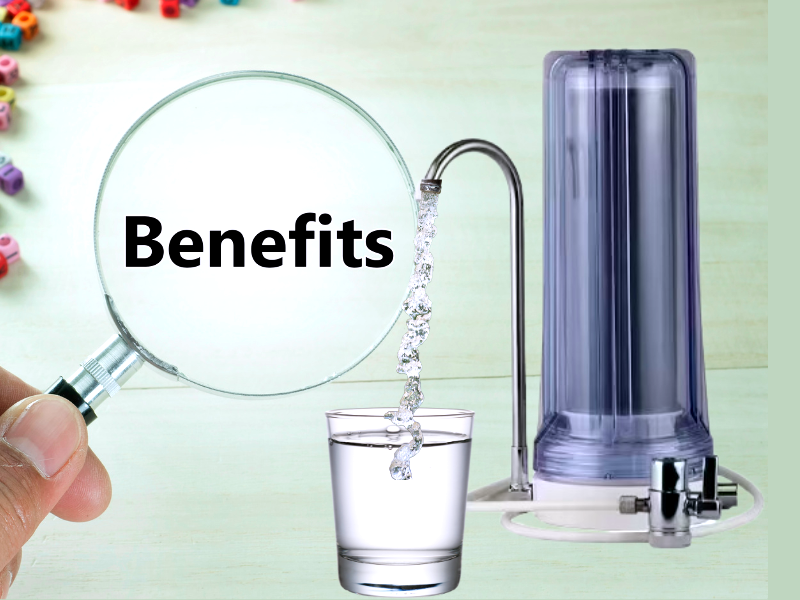
Using a countertop water filter offers several benefits, including improved water quality, better taste and odor, and the removal of harmful contaminants. Additionally, countertop water filters are convenient, easy to use, and can save money compared to buying bottled water. Additionally, using a countertop water filter can provide significant health benefits by reducing exposure to harmful contaminants.
Improved Water Quality
One of the main benefits of using a countertop water filter is the significant reduction in contaminants, leading to improved water quality. These filters can remove many contaminants, including chlorine, lead, VOCs, and bacteria, ensuring your drinking water is clean and safe.
Better Taste and Odor
Countertop water filters can also significantly improve taste by removing chemicals and impurities that can affect flavor. This can make drinking water more enjoyable and encourage you to stay hydrated.
Removal of Harmful Contaminants
Countertop water filters effectively remove contaminants, reducing harmful substances that pose health risks. By using a high-quality filter, you can reduce your exposure to these substances and protect your health.
Convenience and Ease of Use
Countertop water filters are convenient and easy to use, requiring minimal installation and maintenance. They provide a continuous supply of filtered water, making it easy to access clean drinking water whenever needed.
Cost Savings
Using a countertop water filter can save money compared to buying bottled water. While there is an initial investment in the filter system, the cost of replacement cartridges is typically lower than the ongoing expense of purchasing bottled water.
Environmental Benefits

Using a countertop water filter can also have a positive environmental impact by reducing the need for single-use plastic bottles. This can help decrease plastic waste and reduce one’s environmental footprint.
Summary
Choosing the right countertop water filter can make a significant difference in the quality of your drinking water, thanks to advanced filtration technology. Whether you’re looking to remove heavy metals, improve taste, or eliminate harmful microorganisms, there’s a filter that can meet your needs. Activated carbon filters are great for common contaminants like chlorine, while reverse osmosis systems offer a more thorough filtration. Multi-stage filters provide comprehensive cleaning by combining various methods.
When selecting a filter, consider your water quality, filtration methods, filter life, and certification. Doing so will ensure you’re providing your family with clean, safe, and great-tasting water. To stay updated on tips and offers, subscribe to our newsletter today!
FAQs
What is the best countertop water filter for removing heavy metals?
Reverse osmosis systems effectively remove heavy metals like lead, mercury, and arsenic. These systems use a semi-permeable membrane to filter out these contaminants.
How often should I replace my countertop water filter filters?
The frequency of filter replacement depends on the filter type and the amount of water used. Generally, activated carbon filters need to be replaced every 6 to 12 months, while reverse osmosis membranes may last 2 to 3 years.
Can countertop water filters remove microorganisms?
Yes, some countertop water filters, especially those with UV light or advanced filtration stages, can effectively remove or kill harmful microorganisms like bacteria and viruses. Check the filter's specifications to ensure it addresses these concerns.
